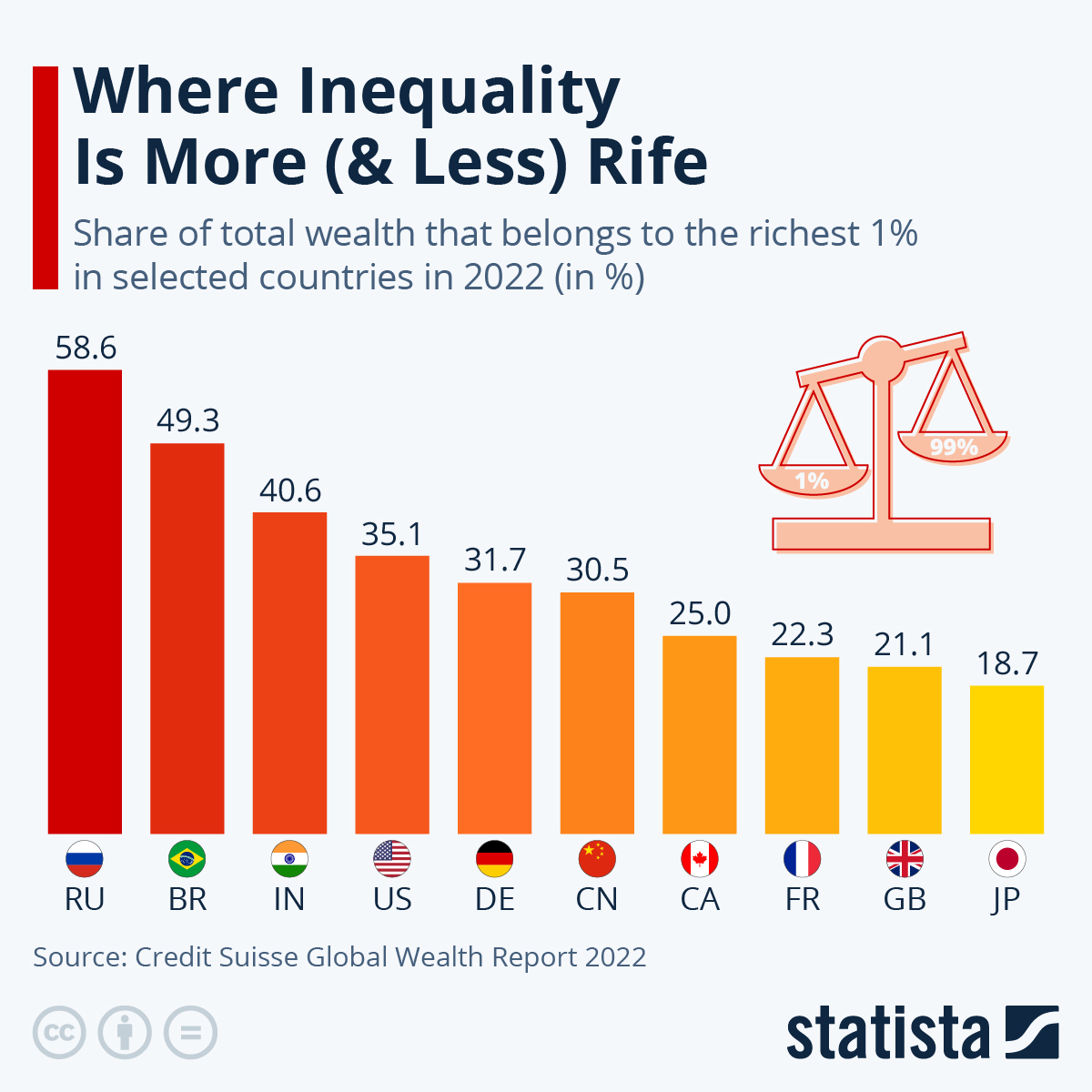Inequality Around the Globe
Inequality Growth and Decline
The Global Wealth Report 2024 was released today by the Swiss bank UBS, highlighting where wealth inequalities have grown the furthest. South Africa comes top of the list, scoring 82 out of 100 on the inequality index, where 0 indicates total equality and 100 indicates absolute inequality. This is a jump of 17.7 percent since 2008. Other countries with particularly high scores were Brazil (81), the United Arab Emirates (77), Saudi Arabia (77) and Sweden (77). Even Japan, which at 54 scored the lowest figure of the markets analyzed, is still far from equal.
 You will find more infographics at Statista
You will find more infographics at StatistaThe gap on inequality has closed slightly in North America since 2008, with the United States recording a decrease of 2.4 percent in that time frame. Inequality has widened in Latin America and much of Eastern Europe and Asia though. This is shown on the chart, with Brazil seeing a wealth increase in inequality of 16.8 percent and Mexico a rise of 6.5 percent, as India saw an increase of 16.2 percent, Singapore of 22.9 percent, Indonesia of 15.1 percent, China of 7.4 percent and Japan of 9.4 percent. South Korea and Hong Kong buck the regional trend, with decreases of 8.1 percent and 5.9 percent, respectively. According to UBS, while inequality is increasing in fast-growing markets, the opposite is true in a number of mature economies, where middle wealth segments are outpacing the pace of growth of higher wealth brackets.
Where Wealth is Concentrated in Africa
56 percent of Africa’s millionaires and over 90 percent of its billionaires lived in just five countries in 2023 - South Africa, Egypt, Nigeria, Kenya and Morocco, according to The Africa Wealth Report 2024 published by Henley & Partners and New World Wealth. There were 135,200 people who owned wealth of 1 million U.S. dollars or more living in the continent that year, as well as 342 centi-millionaires and 21 billionaires.
As the following chart shows, South Africa had the highest number of so-called high net worth individuals (HNWIs) with 37,400 millionaires, 102 centi-millionaires and 5 billionaires. It was followed by Egypt with 15,600 millionaires, 52 centi-millionaires and 7 billionaires, while Nigeria placed 3rd on the continent with 8,226 HNWIs. Rounding up the top ten were Kenya (7,216 HNWIs), Morocco (6,836), Mauritius (5,115), Algeria (2,809), Ghana (2,706), Ethiopia (2,704) and Namibia (2,303).
 You will find more infographics at Statista
You will find more infographics at StatistaLooking at the data in terms of cities, then South Africa’s Johannesburg comes first as the place with most HNWIs in Africa, with 12,300 millionaires, 25 centi-millionaires and 2 billionaires, followed by Cape Town with 7,400 millionaires, 28 centi-millionaires and 1 billionaire. Cairo in Egypt (7,200 millionaires), Nairobi in Kenya (4,400), and Lagos in Nigeria (4,200) also rank high on this basis.
According to Andrew Amoils, Head of Research at New World Wealth, another pattern seen in recent years is that a large number of high net worth individuals are moving abroad. “According to our latest figures, approximately 18,700 high-net-worth individuals have left Africa over the past decade (2013 to 2023). There are currently 54 African born billionaires in the world, including one of the world’s richest, Elon Musk, but only 21 of them still live on the continent”, he said. “Most of these individuals have relocated to the UK, the USA, Australia, and the UAE. Significant numbers have also moved to France, Switzerland, Monaco, Portugal, Canada, New Zealand, and Israel.”
Despite this, the report writers state that Mauritius, Namibia, Morocco, Zambia, Kenya, Uganda, and Rwanda are all expected to experience 80 percent millionaire growth, if not more, in the coming decade